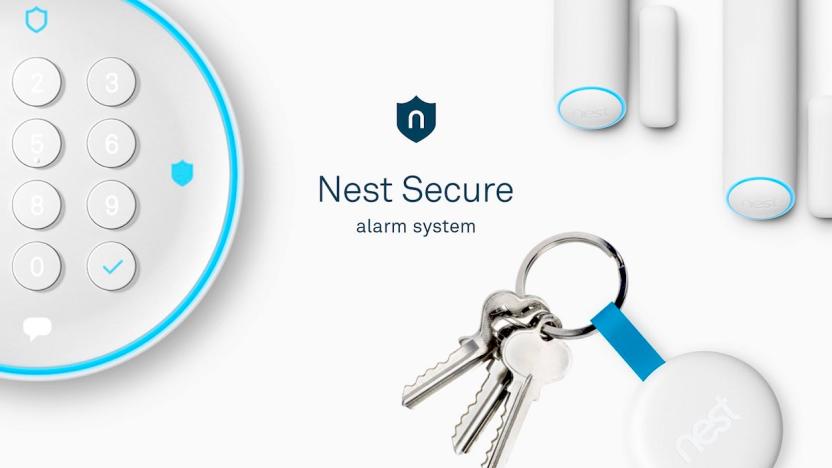detect
Latest

Fitbit gets FDA clearance for its Sense smartwatch and ECG app
Fitbit's Sense smartwatch will be able to detect atrial fibrillation when it arrives in October.

Heathrow Airport installs anti-drone system that can locate UAV pilots
The UK knows first-hand how disruptive drones can be to major airports. Last March, it introduced legislation to widen the drone no-fly zone around airports to five kilometers. Now, to enforce the new rules, London's Heathrow Airport has installed a system to detect and identify unauthorized UAVs.

Nest takes on home defense with its Secure alarm system
Nest wants to manage every aspect of your home's security -- not just its thermostats and cameras. The company has announced a slew of products designed to keep an eye on your home while you're away, under the Nest Secure banner. That includes a Google-Home-looking Guard control system, Detect sensors (placed in rooms, near windows and doors) and a Tag keychain that arms and disarms the security hub. The starter bundle will cost $499, with extra Detect sensors running $59. Need an additional Tag for your roommates or kids? Those will set you back $25 each. A bundle with the Nest Cam Outdoor (this is different from the latest Nest Cam IQ Outdoor) will be available at Best Buy as well as Nest's website for $598.

DARPA wants help hunting for individual photons
America's mad science division wants the ability to see the building blocks of light, but needs the scientific community's help to do so. The agency is launching one of its famous open calls for knowledge, this time under the auspices of the Fundamental Limits of Photon Detection Program. The project is designed to bring together theoretical scientists and engineers to see if it's possible to build an accurate photon detector. In an ideal world, DARPA wants a gadget that can correctly pick out individual photons -- a technology that would prove beneficial in any number of technologies.

Researchers craft new testing device to detect early Alzheimer's
We've heard that the "gold standard" pen and paper test seems to work fairly well at detecting the earliest stage of Alzheimer's disease, but gurus from Georgia Tech and Emory University have teamed up to develop a much quicker method for accomplishing the same. The ten-minute DETECT test utilizes a head-worn visor with a built-in LCD, headphones and a handheld controller, which the patient interacts with as he / she is put through a series of visual and auditory tests that "assess cognitive abilities relative to age," gauge reaction time and measure memory capabilities. Initial tests have purportedly shown it to have "similar accuracy" to the aforementioned pen and paper test (which takes around 90-minutes to administer), and while we've no idea when the device will be available for public use, its creators have already formed a firm (Zenda Technologies) to commercialize it. Finally, a legitimate use for head-mounted displays -- thought we'd never see the day.[Via Wired]

SET CounterBomber spies hazardous humans from a distance
Here's one that's just begging for a profiling fit to be thrown over it. While the CounterBomber won't deem you guilty for creeping through a deserted street or texting your boy while waiting at a stop light, it just might inform everyone in an airport that you're the next suicide bomber waiting to blow. SET Corporation is unveiling a machine that best sport an accuracy level untouchable by mere human instincts, as it plans to sit at major public venues and sporting events to spot potential bomb-toting humans "from up to 50 yards away." The first iteration of the machine will utilize "radar-imaging technology" to somehow "analyze and reveal" concealed objects without actually peeking through folks' clothing, but future versions are slated to incorporate a "gait analysis" bit that could further substantiate if some awkward weight balance is going on underneath the hoodie. Still, we can just imagine the uproar from an innocent young lad with a stiff knee getting carted off due to this gizmo (incorrectly) deeming him suspicious, but considering the CounterBomber could be making its debut within 6 months or so, we'll be sure to find out just how inaccurate it is real soon.[Via CNET]

PS3 pad loses DualShock name and vibration but picks up Wii-esque motion detection and wireless connectivity
In a shocking turn of events, the PS3 controller has gone from banamerang to wireless DualShock 3, except without the DualShock name and vibration.If you take a good look at the back of the new control pad (see the close-up above), you'll notice that the DualShock 2 brand name imprinted on the old controller has now been supplanted by a row of LED lights to show which input has been set, either wirelessly or via the wired USB recharge port. Sony's now the only name in-line for PS3 controllers either on the pad or in the press releases (see "the new PS3 controller").



